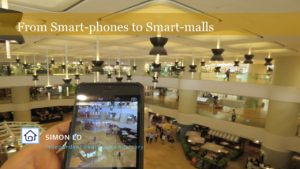


There is a real buzz within the retail industry about the growth of online retail sales due to the advancement in mobile technology and the fact that more than two-thirds of people on earth has access to mobile phone. Supported by the application of “Big Data”, visitors in a retail mall can be prompted to drop by a store where he or she shopped before. No matter it is a WhatsApp message or e-coupon being sent through by a mobile-app or even a guided browsing and recommendation, all these should definitely take visitors’ shopping experience to the next level. How about the shopping malls in Hong Kong? Are they smart enough to capture the online-to-offline (“O2O”) opportunities?
Not long ago, I visited an optical shop in a local mall where a facial recognition scanner was there to take my measurements, and recommend a perfect pair of glasses to fit my face and eyes. What a wonderful experience! As a consumer, I would naturally expect more of these features such as smart-mirrors or interactive mobile-apps to be incorporated in a mall as well. A review of the existing mobile-apps made available by the top-tier local malls tells me a little bit about the current situation.
- One of the most common functions is dining/shopping directory with search function (100%)
- The majority includes some forms of loyalty program (75%)
- There are tons of events and promotions (85%) in it but they are essentially not interactive enough
- About half of them have offered parking coupons (58%)
- Only a few of them provides an e-ticketing and table reservation system (25%)
Other than these, there is virtually nothing to support digital shopping.
The ease of getting physical access to retail malls is excellent in Hong Kong but the accessibility of digital shopping is going to be the key area for improvement in order to make local malls smart enough to communicate directly with shoppers, integrate their mobile habits into physical stores and provide them the best personal guide during their visits.
To read more from Simon Lo on Facebook, please click the following.
www.facebook.com/realtythinktanks
Read on for Chinese version.
香港房地產:智能化商場最新檢視
在”O2O”的年代, 零售行業中的熱話莫過於有關網上零售的谮力和增長, 不斷革新的移動技術和智能手機的普及化,相信地球上現時有超過三份之二的人擁有智能手機。結合”O2O”和”大數據”的分析,購物商場的訪客可以收到更個人化的訊息,例如在手機提示他或她之前在商場逛過的商店,訊息亦可以透過手機APPS,將訪客喜愛商戶的電子優惠券直接透過手機送上,若然購物商場再加設引導性的瀏覽和個人化的購物選項,訪客必定可以享受一個全新的購物體驗。那麼, 香港的購物商場是否擁有智能化的優勢,從而捕捉到“O2O” 帶來的商機呢?
不久之前,我到過區內商場的一家眼鏡店,店内的面部識別掃描器把我的面部和眼睛掃瞄一下,一分鐘之內,不但為我配對了一幅切合我眼睛和臉形的眼鏡,更為我留下一個非常個人化的購物體驗!作為一個消費者,當然會聯想到購物商場有否類似的功能, 例如”智能鏡”或”互動購物的智能手機APPS”等等, 從而為每個消費者提供一個全面智能和個人化的購物過程。
筆者檢視了本地大型商場供免費下載的智能手機APPS和當中的各項功能,結果顯示, 普遍的功能主要是餐飲/購物指南和附設的搜尋器(100%), 另外是購物優惠積分和回饋計劃 (75%), 雖然可以獲得一站式商戶的折扣資訊,促銷及推廣活動 (75%),但可惜是在選擇的過程中缺少互動性, 太多的資訊反而令消費者有點吃不消的感覺;另外, 大約有一半的APPS提供泊車優惠 (58%), 這個相比較其地國家購物商場提供的增值服務, 例如類似酒店般的交通和禮賓服務,仍然有一大距離;最後,只有少部份提供餐飲預約和電子輪候服務 (25%),但最重要的互動數碼購物功能卻暫時欠奉。
購物商場和其他地產項目都是以地點掛帥,但”O2O” 是跨地域的,要令購物商場整體商戶得益,就要把握每一組甚至每一個消費者在實體購物商場內的消費模式和情緒; 交通便利一向是香港各大購物商場的優勢,但數碼化的購物輔助功能卻仍有改善空間,智能化購物商場的重點是直接與消費者進行溝通,將他們在線上的習慣融入到實體商場,並可以令消費者在到訪期間,得到最佳的個人化嚮導。
To read more from Simon Lo on Facebook, please click the following.
Leave a Reply